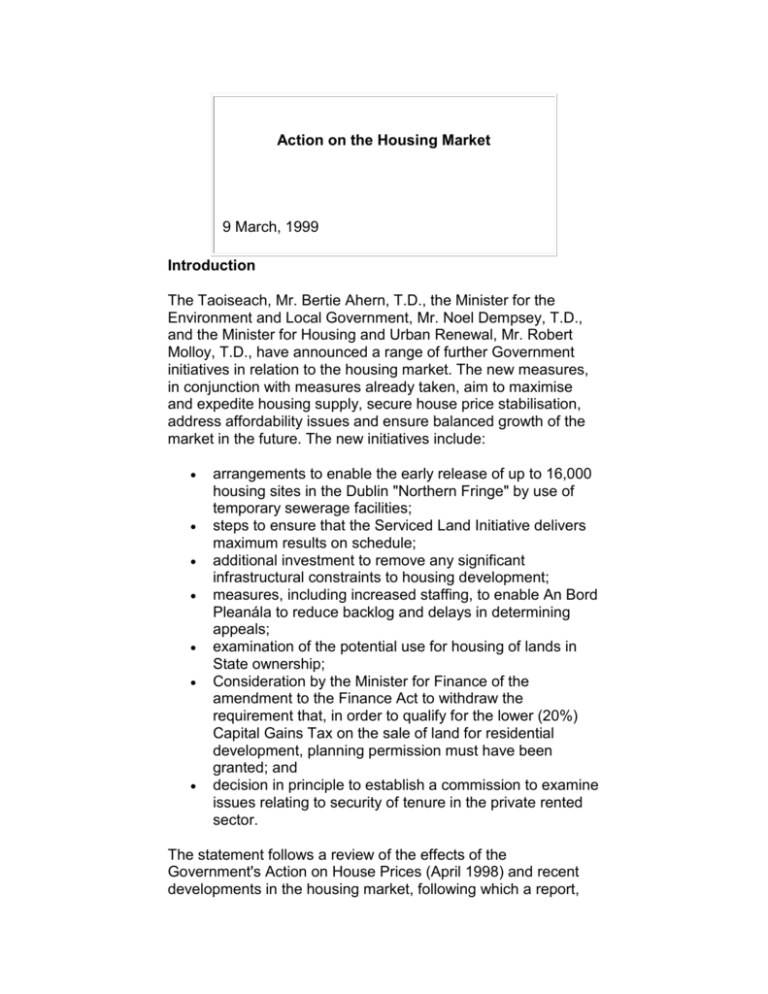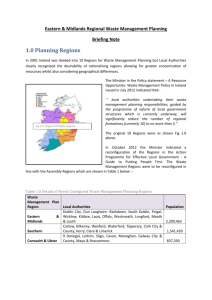Action on the Housing Market (1999) (Following the Second Bacon
advertisement

Action on the Housing Market 9 March, 1999 Introduction The Taoiseach, Mr. Bertie Ahern, T.D., the Minister for the Environment and Local Government, Mr. Noel Dempsey, T.D., and the Minister for Housing and Urban Renewal, Mr. Robert Molloy, T.D., have announced a range of further Government initiatives in relation to the housing market. The new measures, in conjunction with measures already taken, aim to maximise and expedite housing supply, secure house price stabilisation, address affordability issues and ensure balanced growth of the market in the future. The new initiatives include: arrangements to enable the early release of up to 16,000 housing sites in the Dublin "Northern Fringe" by use of temporary sewerage facilities; steps to ensure that the Serviced Land Initiative delivers maximum results on schedule; additional investment to remove any significant infrastructural constraints to housing development; measures, including increased staffing, to enable An Bord Pleanála to reduce backlog and delays in determining appeals; examination of the potential use for housing of lands in State ownership; Consideration by the Minister for Finance of the amendment to the Finance Act to withdraw the requirement that, in order to qualify for the lower (20%) Capital Gains Tax on the sale of land for residential development, planning permission must have been granted; and decision in principle to establish a commission to examine issues relating to security of tenure in the private rented sector. The statement follows a review of the effects of the Government's Action on House Prices (April 1998) and recent developments in the housing market, following which a report, entitled The Housing Market: An Economic Review and Assessment, prepared by Peter Bacon and Associates, Economic Consultants, has been published. The main recommendations of the consultants' report are summarised in this document, along with the Government's policy response to the recommendations. An outline of progress since publication of Action on House Prices is given in Appendix 1, and house price data for the December quarter, 1998, are shown in summary form in Appendix 2. The consultants emphasise the need for a strategic plan for the location and scale of development in the overall Dublin/Mid East regions having regard to the potential of towns outside the Dublin conurbation, and for more balanced distribution of population and economic activity nationally. Strategic Planning Guidelines for the greater Dublin area are being announced on 25 March, 1999. The further measures now being undertaken, those already introduced under Action on House Prices, and the various other initiatives underway, provide a comprehensive and coherent response to the major issues that arise in the housing market. Prompt and effective implementation of the various measures will be accorded high priority to copperfasten the significant progress already being made towards price stabilisation, increasing housing supply and ensuring availability of land to underpin this. Main Recommendations in The Housing Market: An Economic Review and Assessment (March 1999) and Government's Policy Response Recommendation - Land Servicing Interim/temporary arrangements, including temporary treatment facilities, should be used to make zoned land immediately available for housing, particularly land awaiting construction of the Dublin North Fringe Interceptor Sewer. Policy Response The Department of the Environment and Local Government have requested local authorities to permit, where appropriate and subject to necessary environmental safeguards, the use of temporary facilities, to allow residential development to proceed quickly in advance of the provision of the necessary permanent facilities. This has potential to bring forward up to 16,000 housing units in the short term in the Dublin North Fringe. Recommendation - PPP Arrangements The potential use of PPP arrangements to develop the North Fringe Interceptor Sewer should be examined. Policy Response The Department of the Environment and Local Government will examine the possible use of PPP arrangements for this development. Consideration of funding will not delay commencement of the project and any necessary public funding for this project will be provided under the forthcoming National Development Plan. Recommendation - Serviced Land Initiative Local authorities should ensure that deadlines for commencement and completion of Serviced Land Initiative (SLI) schemes are met. Policy Response The Department of the Environment and Local Government have requested local authorities to expedite delivery of SLI schemes, which will provide an estimated 100,000 additional serviced sites, over and above land coming on stream under the main Water and Sewerage Investment Programme. Local authorities estimate that at least 38,000 sites are scheduled to get to construction this year. Schemes providing 24,000 serviced sites are due to start in the Dublin Region (Dublin local authorities, Kildare, Meath and Wicklow) alone in 1999, with an estimated 8,200 of these to reach completion this year. Procedures have been streamlined to minimise delays. Progress on schemes will be monitored very closely to identify any possible delay factors as early as possible and ensure that these are addressed immediately. This will help to ensure that deadlines are adhered to and that the Initiative delivers maximum results as quickly as possible. Recommendation - Roads and Public Transport Infrastructure Any infrastructural constraints to residential development (including roads and public transport access) should be identified with input from all interested parties (including local authorities and developers). A report detailing the infrastructure, cost and potential housing involved to be produced within six months. Policy Response Arrangements to identify infrastructural constraints in major growth centres will be put in place in the near future. The Government is committed to provide additional resources to remove any significant constraints to housing development with minimum delay. Recommendation - Public Transport Specific proposal should be formulated at an early date for improvement in public transport facilities to locations having the scope for growth (without adverse planning, social and sustainability effects) and a supply of land suitable for development. Policy Response Proposals for improvement in public transport facilities to relevant locations will be given particular attention in the consideration of the strategic transport needs of the country as a whole in the context of the preparation of the National Development Plan and the forthcoming Strategic Planning Guidelines for the Greater Dublin Area. On 4 March, 1999, the Minister for Public Enterprise announced that feasibility and cost studies would be undertaken without delay on proposals for short and longer term development of the suburban rail networks in Dublin and Cork. Recommendation - Capital Gains Tax The requirement of prior planning permission in order to qualify for reduced CGT on disposal of development land should be withdrawn and arrangements introduced to recover any tax due if land is not developed. Policy Response The tax code is being amended to provide, in the case of disposals of land which are made between 10 March, 1999, and 5 April, 2002, that the concession whereby the reduced CGT rate of 20% applies to disposals of land to a local authority for the purposes of the Housing Acts, regardless of whether planning permission exists, will also apply to disposals of land for such purposes to voluntary housing bodies and the National Building Agency, and to disposals, to any party, of land which is zoned for residential purposes. Recommendation - Planning Appeals An Bord Pleanála should be asked to submit proposals in relation to their efficiency, effectiveness and adequacy of resources. Policy Response Delays in planning appeals stem from the unprecedented increase in the intake of cases, the level of appeals having doubled within the last five years. Last October, the Minister approved proposals submitted by the Bord for staff and other resources. However, the Bord has experienced considerable delay in recruiting additional staff, particularly Planning Inspectors. The Bord recently submitted proposals for additional staffing resources, which have now been approved by the Minister. Agreement has also been reached between the Bord and the Department on a number of additional measures, e.g. greater use of outside consultants and approval to the appointment of an additional member of the Bord, to help reduce the backlog and the delays generally in determining appeals. Recommendation - Housing Density The Minister for the Environment and Local Government should issue a Directive to planning authorities under the Planning Acts on increased housing densities, incorporating conclusions and recommendations of the recent consultants' report on densities. Policy Response The Department of the Environment and Local Government have published draft Planning Guidelines on housing densities for public consultation. Local authorities have already been instructed to implement them even in draft form. The final Guidelines will be issued by the Department as soon as possible, and local authorities and An Bord Pleanála will be obliged under law to have regard to them. Recommendation - Affordable Housing Mix The provision of more affordable housing for first time buyers can be achieved through changes in densities and designs, involving the provision of a proportion of better designed and, possibly, smaller units, integrated with wider developments at appropriate locations (e.g. city locations, adjacent to high quality public transport and other amenities). This approach should be encouraged and local authorities should avail of all possibilities under the Planning Acts (e.g. through planning control and density policies) to ensure that demand for different house types and sizes is satisfied. The need to strengthen the Planning Acts to support the objectives of modern housing policy, including the provision of affordable housing and a necessary mix of house types and sizes, should be considered in the context of the forthcoming Planning Bill. Policy Response Some local authorities have already been making moves in this direction and the Residential Density Guidelines will further assist them in doing so. The Department fully supports this objective and is considering, in conjunction with the Attorney General's Office, how the forthcoming reform of Planning legislation can be used to reinforce the powers of local authorities to deliver on it. Recommendation - Affordability Initiatives Initiatives to promote affordability for those unable to obtain adequate mortgage finance to purchase at current house prices could be considered in appropriate circumstances. Possible options include extension of the local authority shared ownership scheme; implementation of a local authority scheme for provision of affordable housing; or a private sector shared equity scheme. Such measures should be considered only in the context of sustained price stabilisation and significant increase in housing supply. Policy Response A new Affordable Housing Scheme was recently launched, through which local authorities will provide, on land available to them, additional new houses to help lower income households purchase their own homes. An essential element of the scheme is that it is directly linked to the delivery of additional supply of housing. Other approaches which would involve access to additional mortgage funding without the necessary pre-requisite of an increase in housing supply will not be promoted at this stage. Recommendation - Mortgage Lending Multiples Possible change in mortgage lending multiples, from a gross to net income basis, could be considered in appropriate circumstances. The Central Bank would conduct consultations with mortgage lenders, regarding the details and timing of possible changes. Changes to be implemented only when there is evidence of general easing of supply pressures in housing market. Policy Response The Department of the Environment and Local Government will consult with the Central Bank and mortgage lenders on this matter which must, however, be largely contingent on increased housing supply and sustained house price stabilisation. Recommendation - Urban Renewal Incentives Local authorities should consider whether residential allowances under the 1999 Urban Renewal Scheme should be subject to conditions relating to accommodation such as design, construction, size, and mix of house types and sizes and amenities to be provided. Policy Response In September 1995, guidelines issued covering the overall standard of design, construction and mix of residential accommodation being provided in designated areas. Local authorities were instructed to ensure that all future developments in designated areas complied with the guidelines. The period since the guidelines issued has seen marked improvements in the standard of apartments being provided in designated areas. Revisions to the Guidelines will, however, be made and implemented as necessary to improve standards further. Separate guidelines for the preparation of integrated area plans under the new Urban Renewal Scheme also emphasise the importance of ensuring a pleasant longterm environment, to encourage residents to make a longterm commitment to town centre living. Under the Urban Renewal Act of 1998, local authorities must certify that developments are consistent with the relevant integrated area plan before they can qualify for tax incentives. Recommendation - Voluntary Housing Proposals should be sought from the Voluntary Housing Sector for expansion of its role to provide owner occupied and rented accommodation. Policy Response The Department of the Environment and Local Government will, at an early date, discuss with, and invite proposals from, the Voluntary Housing Sector on ways of expanding the voluntary housing programme for both owner-occupation and renting, with the objective of increasing voluntary housing output to 4,000/5000 per annum. In the light of the outcome, it would be envisaged that the Affordable Housing Package announced on 2 March would apply to voluntary bodies. Recommendation - Landlord and Tenant Legislation Landlord and Tenant legislation should be reviewed to address possible barriers to investment in the private rented sector and the issue of appropriate balance of tenure rights. Policy Response In order to assist with consideration of policy responses in this area, the Department of the Environment and Local Government have recently requested the Attorney General's Office to have the scope for improving security of tenure in the private rented sector examined by an expert in the area, having regard to constitutional rights and the complex legal issues involved. The Government have decided in principle that a commission should be established to examine issues relating to security of tenure. Recommendation - Tax Relief for Tenants The maximum tax relief for tenants in private rented accommodation should be increased in line with the trend in rents. Policy Response This proposal requires further consideration in the context of overall budgetary policy, having regard particularly to the cost of the additional relief. Recommendation - Strategic Planning Local authorities in the Dublin/Mid East regions should review their Development Plans to harmonise their policies and objectives with those of the forthcoming Strategic Planning Guidelines. Policy Response The Minister for the Environment and Local Government has already stated that he expects all of the local authorities concerned to review their Development Plans, even those recently adopted, to ensure that they are in line with Strategic Planning Guidelines. Following publication of the Guidelines on 25 March, 1999, the Department of the Environment and Local Government will formally request the local authorities in Dublin and the Mid East to ensure that the policies and objectives in their Development Plans are consistent with those in the Strategic Planning Guidelines and that the strategy in the Guidelines in relation to the location and scale of development for Dublin and the Mid East will be implemented effectively at sub-regional level through the Development Plans in the medium term. Recommendation - National Development Plan The forthcoming National Development Plan should address the issue of geographical balance of economic activity and population distribution. Policy Response The Government is addressing the issues of achieving better geographical balance of economic activity and population distribution in the National Development Plan 2000-2006, and the current proposals for regionalisation of the country for EU Structural Funding and State Aid Purposes. Recommendation - Land Use A comprehensive land use analysis of the Dublin and Mid-East Regions should be undertaken. Policy Response The local authorities in the Greater Dublin Area are in the process of reviewing, or have reviewed, their Development Plans. On completion of the Strategic Planning Guidelines, which will provide an overall strategic context, the authorities will be required to ensure that those Development Plans are consistent with these Guidelines. The Department have recently carried out a detailed examination of serviced residential land supply. In the Greater Dublin Area, the position is as follows: 64,226 housing units available at end 1998, a further 39,968 units available by end 2000, a further 41,789 available by end 2003, giving a total to the end of the six-year period to 2003 of 146,000 housing units. Even allowing for an increase in housing output, the additional land coming on stream in the period up to 2003 will mean that supply of serviced land will continue to improve. Recommendation - National Spatial Development Strategy A National Spatial Development Strategy should be formulated to facilitate development of policy in regard to distribution of population and economic activity. Policy Response The Government has decided in principle to draw up a National Spatial Development Strategy. Appendix 1 Recent Trends in House Prices An immediate priority in Action on House Prices (April 1998) was to curb serious overheating and house price inflation, which had built up over the previous three or four years, particularly through removal of speculative demand, calming of price expectations and implementing measures to increase housing supply. House price data for the December quarter, 1998, are given in summary form in Appendix 2. This demonstrates evidence of moderation in the trend of house price increase: The rate of annual increase in Dublin is lower than at any period since the third quarter of 1997 Prices increased much less sharply in the second half of 1998 than in the first, especially in Dublin. The consultants' report confirms a wide consensus that the Government actions have played a key role in achieving price slowdown, which they point out, represents a positive achievement against the background of continued economic growth and low interest rates. There is also wide agreement that there are further beneficial effects to come from the measures already taken. The further steps now being announced will reinforce these effects within a strategic and forward-looking policy framework. Housing Supply Increased housing supply, particularly in Dublin, is the cornerstone of policy for price stabilisation and balance in the housing market. This means bringing forward land for housing more quickly, dealing effectively with constraints on this or delays to development, and maximising the potential of available land. Considerable progress has been made with housing supply since the publication of Action on House Prices: 42,349 new housing units completed in 1998 - up 9% in a single year significant housing schemes are in the pipeline a marked increase in planning permissions - to record levels in 1998. Registrations under the HomeBond guarantee scheme for new houses were up 7.3% in 1998, and the January 1999 total was 12.7% higher than in January 1998, pointing to continued increase in housing output. The Serviced Land Initiative is estimatred to yield 100,000 housing sites nationally in 1999 and 2000 - these sites are additional to sites which become available in the normal course under the main infrastructural investment programmes. The total estimated potential supply of housing land in Dublin is higher than previously reckoned - 90,000 sites compared with the consultants' 1998 estimate of 79,000. Housing Density Increased availability of land for building needs to be accompanied by optimal use of that scarce resource. Density is a critical factor in this. The consultants report positive effects of the steps taken to promote increased density under Action on House Prices, for example, in recent Development Plans in the Dublin area. Local authorities have been instructed to implement recently published Planning Guidelines on housing densities even in their draft form. Housing Affordability Measures introduced under Action on House Prices are already helping to assist affordability for lower income house buyers, particularly through withdrawal of investor incentives, reduced stamp duty and improvements in the local authority shared ownership scheme. Further innovative approaches to the issue of housing affordability are now being pursued, including: the recently launched Local Authority Affordable Housing Scheme which specifically addresses the issue by providing additional new houses for lower income purchasers without fuelling house prices. the objective of achieving a better mix of affordable type units in new developments is being promoted. The scope for reinforcing the powers of local authorities in this regard is being examined in the context of Planning Law reform. Private Rented Sector The measures being taken to increase the overall supply of housing and stabilise house prices will help to relieve pressures in the private rented sector. In addition, The scheme of "section 23" type incentives announced in Budget 99 for the provision of student accommodation will help to expand the supply of good quality and affordable accommodation for students and will also ease pressure on the overall rental market The recently announced Urban Renewal Scheme provides for allowances for rented as well as owner occupied accommodation. Appendix 2 Average House Prices - December quarter, 1998 The changes in average house prices between the December quarter 1998 and the September quarter 1998 and between the December quarter 1998 and the corresponding quarter in 1997 are as follows: (with previous quarterly and annual changes in brackets) House type Average Price Change on Sept Qtr '98 Change on Dec Qtr '97 (Sept on June Qtr) (Sept'98 on Sept'97) New House Prices Nationally £106,514 + 9.1% (+ 1.8%) + 23.3% (+ 20.1%) Dublin Area £132,941 + 4.6% (+ 2.2%) + 25.8% (+ 32.4%) Second-hand House Prices Nationally £116,403 + 5.5% (+ 8.2%) + 29.2% (+ 36.6%) Dublin Area £148,745 + 0.8% (+ 10.1%) (+ 41.7%) + 27.4% File Updated On: 29:05:2000







